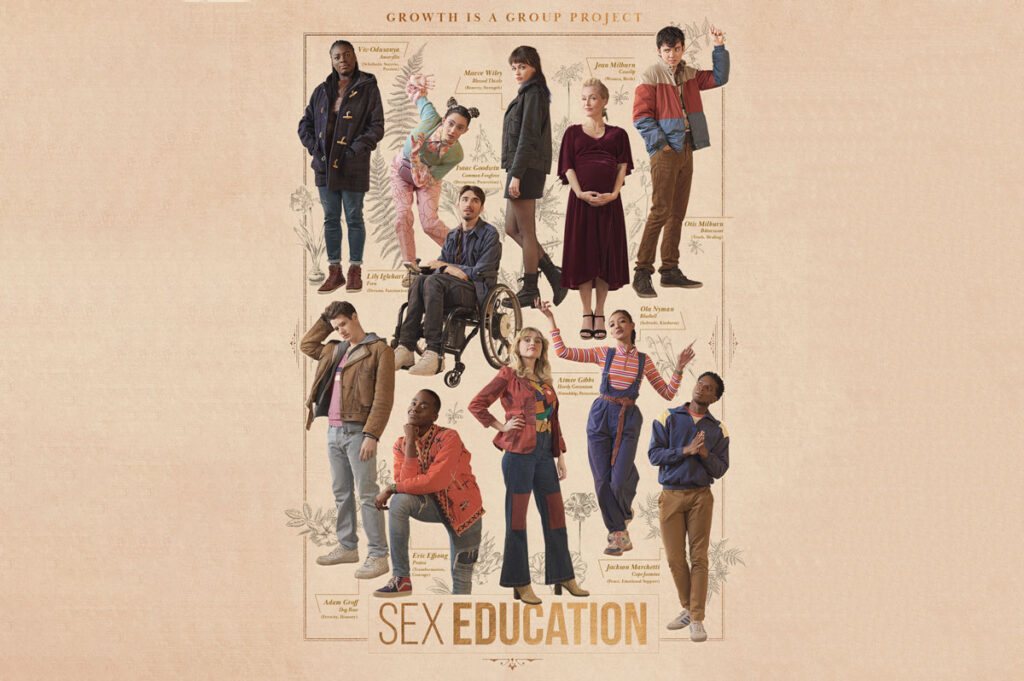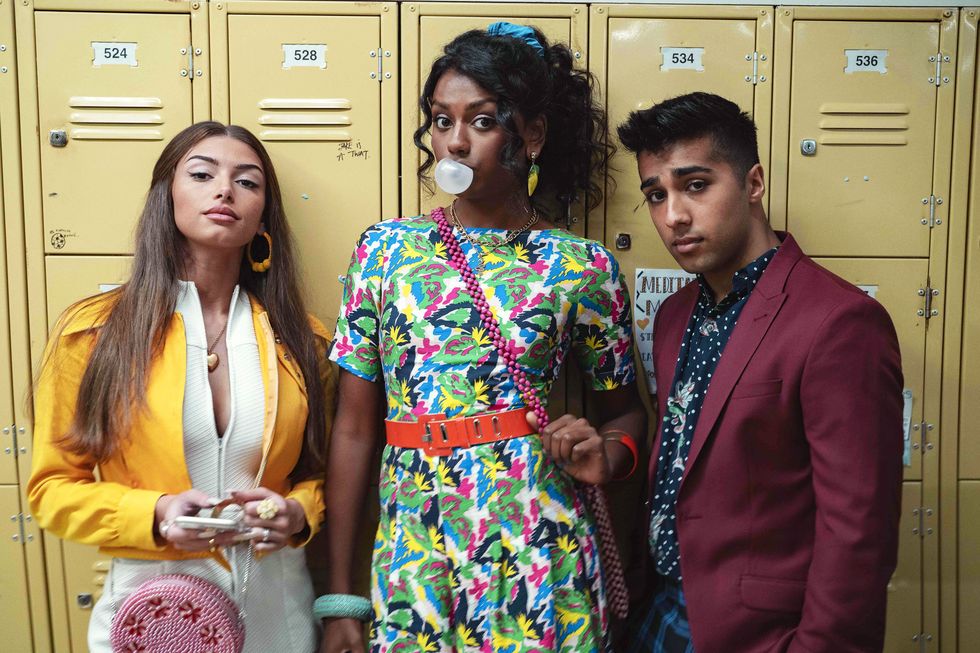By Mado Gianni,
Sex Education Season 3 came out on the 17th of September, just in time for the beginning of schools. With even more characters and refreshing new stories, the episodes could not have succeeded but to keep the viewers on their screens.
The award-nominated television series Sex Education is a teenage comedy-drama series created by Laurie Nunn, a BAFTA breakthrough Brit. As with every teenage-oriented movie or TV series, Sex Education puts one back into the shoes of a secondary school student, only, with the exception that its primary topic is one that has not been talked about before: hormones.
Otis Milburn (Asa Butterfield), son of sex therapist Jean Milburn (Gillian Anderson), teams up with Maeve Riley (Emma Mackey), who come up with the idea of creating a sex clinic to help their fellow classmates and make some money for themselves. The clinic operates anonymously on the abandoned washroom building behind the school, standing as a symbol of self-assertion for the students. With that overarching theme, the narrative develops independently, as each and every one student in the school faces their own sexual problems and dilemmas.
As it happens with most television content, the cast is as significant as the writing. That is to say, if you have a magnificently written character played by an average actor, you will most probably end up with an unmemorable performance; and vice versa. Therefore, I deem it necessary to take a moment and think about the cast, as well as the characters.

Gillian Anderson, first and most popularly of all, with her reverberating persona, adds a lot to the series (on and off-screen). Yet, it must be Ncuti Gatwa, as confident and effortless Eric, who steals the show and becomes one of the reasons for its inadvertent success. It is not just that Eric is a homosexual character or that Gatwa is a Rwandan-Scottish black actor, as much as it is the energy that the actor brings into the series. His performance is authentic, as if Eric’s character had been written upon Gatwa.
An interesting approach to secondary school dynamics (in season three) is the revelation of Ruby’s (Mimi Keene) humane and vulnerable side. Contrary to other teenage-related material, the popular girl of Moordale Secondary in Sex Education comes neither from a wealthy background, nor from an ill-treated family environment. Ruby is a well-behaved, grateful and thoughtful daughter at home while she retains a scary-looking, snobbish attitude at school. Her friends, Anwar (Chaneil Kular) and Olivia (Simone Ashley) are also not to be taken lightly, as they and Ruby make up the school’s popular trio. They are inaccessible and judge-y to others, but they are kind and supportive to each other.
Connor Swindells as Adam, Aimee Lou Wood as Aimee, and Tanya Reynolds as Lily are definitely some of the most realistic performances on the show giving due credit to their intrinsically troubled characters. Patricia Allison as Ola and Kedar Williams-Stirling as Jackson are also very talented in their performances, complementing the whole of a cast that perfectly weaves the fiber surrounding the series.
Last but not least, Emma Mackey as Maeve and Asa Butterfield as Otis are undeniably the main point of interest of the series and, quite ironically, it is love and not sex that will keep this narrative advancing. In fact, the fine line between love and sex is beautifully tended for by Nunn’s team of very talented writers.
When Ruby tells Otis that she loves him and he does not say it back, Ruby’s heart is broken and consequently, the relationship cannot go on, even if they supposedly have had great sex. Within a few episodes, Keene as Ruby manages to gain an impalpable sympathy from the audience, which Mean Girls, even if they tried, they could not attain. Eric and Adam love each other before they even have sex, but that love is what outgrows them as they take their separate paths into their last year of school. Ola loves Lily despite Lily’s crazy sexual fantasies, which they end up exploring together.

It would be an omission not to mention George Robinson as Isaac, Maeve’s neighbor, and love interest, who does not only play a disabled character, but is actually a real-life paraplegic. Apart from Robinson’s exceptional performance, which deserves acknowledgment, Isaac and Maeve share a scene where they come really close -physically. They do not love each other yet (and who knows if they ever will), but they are also respectful and understanding of each other; and still young to want to explore one another.
Quite on the contrary to all the young characters in Sex Education, it is no secret that the adults in the series are the ones who have not been properly sexually educated in order to be able to protect their relationships and maintain their love. A fine example of that statement would be that of Michael and Maureen Groff (Alistair Petrie and Samantha Spiro respectively).
As much diverse and inclusive as Sex Education strives and succeeds to be episode after episode, this is not the only reason that it can be considered a progressive television series. Rather, the character development of all the appearing characters is what makes the show so much more refreshing and appealing to its viewers. “I think it’s something about the characters really constantly wanting to work towards self-improvement. And I think that that sort of shows a vision of the world that maybe people are not feeling on a day-to-day basis”, says Laurie Nunn in an interview at NPR when asked about the success of the series.
In season three, Dua Saleh as Cal is the first non-binary person/ character who joins the cast of Sex Education. The writers seem to have been very careful with Cal’s character development from an outsider to someone who opens up and wants to be understood to someone who is still exploring their queerness and knows only as much. Because it does not matter if you are straight, gay, non-binary, black, white, or brown; young or old, experienced or non-experienced. What matters is talking, listening, understanding, realizing, apologizing, feeling, perceiving, communicating. And that is a rule for everyone, no exceptions.
Sex Education tackles this human phenomenon by dismissing all stereotypes and bringing forth not just a diversified modern world, but a progressive reality where everyone feels safe in making mistakes and is ever more likely to improve because of them.
References
- Laurie Nunn Talks ‘Sex Education’ Season 3, npr, Available here
- Sex Education creator Laurie Nunn on transforming the awkward teenage experience into a TV masterpiece, rts.org, Available here
- Screen Writer Laurie Nunn | Breakthrough Brits 2019, YouTube, Available here
- Sex Education actor George Robinson is a real life paraplegic; know about the condition, indianexpress, Available here




